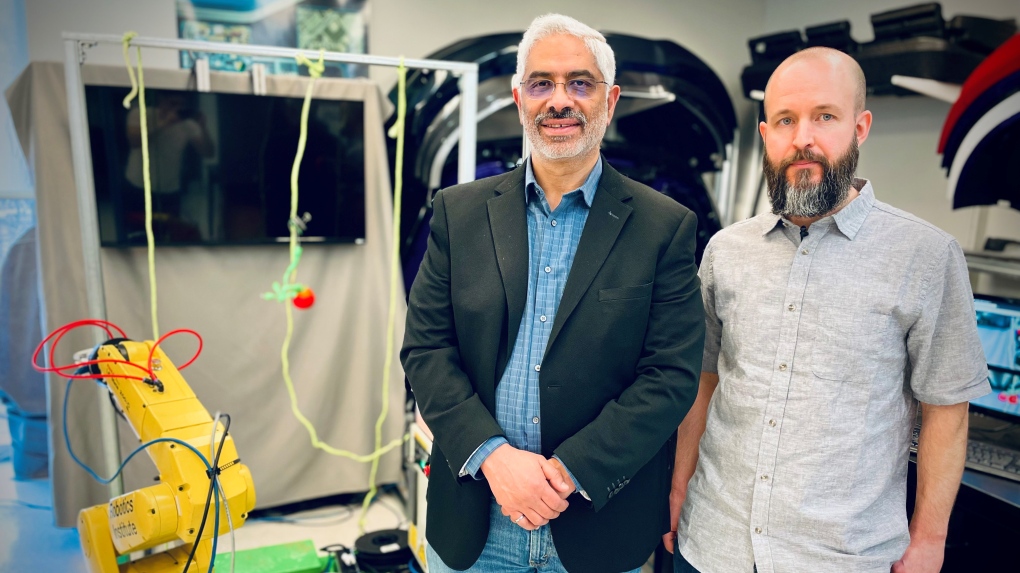Smart robot could transform produce picking farms
A new smart robot could transform the way farmers pick tomatoes.
Researchers at the University of Guelph have developed a grasping system which, when combined with artificial intelligence, can pick up produce.
“It can actually see the tomatoes on the vine,” research assistant Cole Tarry said.
The yellow-armed robot then secures the tomato, pulls it from the vine and places it in a bin.
A simple motion, but one that isn’t straightforward.
Researchers say greenhouses are considered “hostile” environments.
“The objects that you are dealing with are fragile,” explained Medhat Moussa, a professor at U of G’s school of engineering. “These plants are actually hanging literally by a thread.”
With little room for error, why are researchers giving robots this delicate task when humans are better suited to pick tomatoes?
 Medhat Moussa, a professor at U of G’s school of engineering (left), and research assistant Cole Tarry (right). (Spencer Turcotte/CTV Kitchener)
Medhat Moussa, a professor at U of G’s school of engineering (left), and research assistant Cole Tarry (right). (Spencer Turcotte/CTV Kitchener)
“We have a labour shortage when it comes to working in agriculture,” Moussa said. “[At] the same time, the agriculture industry is facing an aging problem.”
According to a report from the Canadian Agriculture Human Resource Council, one-third of agricultural workforce are expected to retire by 2030, meaning more than 100,000 jobs could go unfilled.
Robots, like the one being developed at the University of Guelph, could be the solution.
“Of course, the robots can work longer hours,” Moussa said.
The machine is being tested at Singh Greenhouses in Millgrove, Ont. The project was first inspired by growers in Leamington, Ont. who urged the development of automated solutions. Researchers are currently working to improve the technology.
“The challenge is to do all of this to match the human cycle,” Moussa explained. “Human cycles are six seconds per harvest. We have a system that is successful in terms of picking up these beefsteak tomatoes, but [we’re at] 18 seconds. So the next stage is to bring it all the way lower, to say, eight seconds.”
The robot will also analyze the health of every plant and feed that information back into a database that will attempt to optimize the farming operation.
Researchers have also set new goals for the technology.
They hope the robot will one day be able to also pick up peppers and strawberries.
The technology has been in development at U of G for more than a decade.
CTVNews.ca Top Stories

Poilievre writes to GG calling for House recall, confidence vote after Singh declares he's ready to bring Liberals down
Conservative Leader Pierre Poilievre has written to Gov. Gen. Mary Simon, imploring her to 'use your authority to inform the prime minister that he must' recall the House of Commons so a non-confidence vote can be held. This move comes in light of NDP Leader Jagmeet Singh publishing a letter stating his caucus 'will vote to bring this government down' sometime in 2025.
School custodian stages surprise for Kitchener, Ont. students ahead of holiday break
He’s no Elf on the Shelf, but maybe closer to Ward of the Board.
Kelly Clarkson's subtle yet satisfying message to anyone single this Christmas
The singer and daytime-talk show host released a fireside video to accompany her 2021 holiday album, “When Christmas Comes Around” that she dubbed, “When Christmas Comes Around…Again.
Judge sentences Quebecer convicted of triple murder who shows 'no remorse'
A Quebecer convicted in a triple murder on Montreal's South Shore has been sentenced to life in prison without chance of parole for 20 years in the second-degree death of Synthia Bussieres.
At least 2 dead, 60 hurt after car drives into German Christmas market in suspected attack
A car plowed into a busy outdoor Christmas market in the eastern German city of Magdeburg on Friday, killing at least two people and injuring at least 60 others in what authorities suspect was an attack.
16-year-old German exchange student dies after North Vancouver crash
A 16-year-old high school student from Germany who was hit by a Jeep in North Vancouver, B.C., last weekend has died in hospital, authorities confirmed.
Poilievre to Trump: 'Canada will never be the 51st state'
Conservative leader Pierre Poilievre is responding to U.S. president-elect Donald Trump’s ongoing suggestions that Canada become the 51st state, saying it will 'never happen.'
Canadiens executive says he has 'no concern' about members of the front office travelling to Russia
Montreal executive vice president of hockey operations Jeff Gorton said he has 'no concern' about members of the Canadiens' front office travelling to Russia with the country’s war in Ukraine ongoing.
Speeding drivers get holiday surprise from 'Officer Grinch'
Drivers in the Florida Keys who exceed the speed limit in school zones may run into a well-known gloomy green creature and get a surprising 'gift.'


































